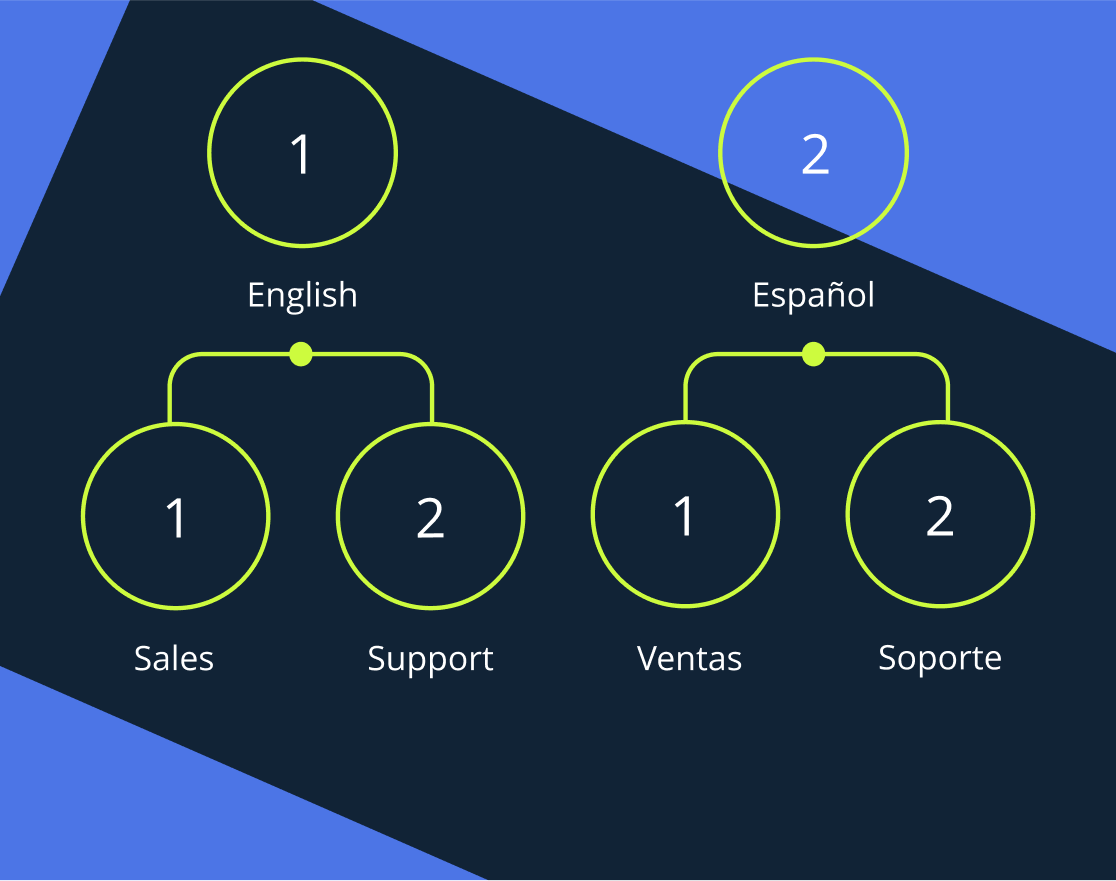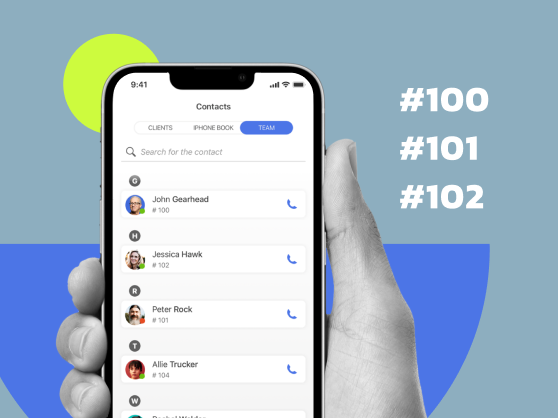Choosing the best call center monitoring system is essential for enhancing call center operations. This article explores top-rated solutions that can help you analyze communication quality, train agents, and ensure compliance with regulations. Discover how advanced features can transform your customer service approach and increase operational success. Whether for small businesses or large enterprises, the right software can significantly impact your team’s performance and customer satisfaction.
What is a call monitoring software?
Call monitoring software is a tool used by call centers to evaluate and improve customer service interactions. This technology records, analyzes, and manages voice communications to ensure quality control, compliance with regulations, and staff training. By providing insights into conversation dynamics, it serves as one of the most important call center features.
How does call monitoring software work?
Call center agent monitoring software integrates with a company’s phone system to record and analyze customer service calls in real-time. It utilizes advanced analytics, including speech recognition and sentiment analysis, to assess the quality of interactions and identify areas for improvement. In call centers, this software provides supervisors the tools to listen in on live calls, offer real-time coaching, and review recorded interactions for training purposes.
Types of monitoring features include:
- Call listening: Supervisors discreetly listen to live calls, taking notes for later feedback without engaging directly.
- Call barging: Supervisors intervene in live calls to directly address customer issues or correct agent missteps.
- Call whispering: Covert guidance is provided to call center agents during calls, advising on key points to mention or correct without the customer’s awareness.
- Call intercept: In critical situations, supervisors can disconnect the agent and take over the call entirely to manage the conversation directly.
- Call recording: Calls are recorded for subsequent review, allowing managers to assess call content, duration, and participant interaction after the fact.
The list of top call monitoring software
Selecting the right service is critical for improving customer service and ensuring quality interactions. Here’s a curated list of best call monitoring services, each chosen for their distinct features and strong performance:
- MightyCall – Offers a complete suite of features, ideal for real-time and recorded call analysis.
- Talkdesk – Known for innovative AI features that enhance both customer and agent experiences.
- Dialpad – Notable for its integrations and user-friendly interface.
- JustCall – A solid choice for businesses needing basic system without call intercept.
- CloudCall – Best for businesses prioritizing CRM integration, excluding the call intercept feature.
- CallHippo – Provides essential monitoring features with an emphasis on simplicity and effectiveness.
- Zendesk – Integrates well with existing customer service suites, offering consistent monitoring without call intercept.
- Nextiva – Famed for reliability and extensive communication call monitoring solutions.
- Aircall – Suitable for teams seeking a straightforward setup, minus barge-in or intercept features.
- RingCentral – A solid solution for large teams and complex requirements.
- NICE – Focuses on analytics and scalability for enterprise-level needs.
- Five9 – Ideal for organizations seeking advanced functionality minus the call intercept.
Comparison of call monitoring software capabilities
Here’s a short comparison of the main call monitoring tools for the software listed above, such as: call listening, barging, whispering, intercept, and recording, along with pricing details for annual plans.
| Software | Call Listening | Call Barging | Call Whispering | Call Intercept | Call Recording | Price/User/Mo* |
|---|---|---|---|---|---|---|
| MightyCall | Yes | Yes | Yes | Yes | Yes | From $23 |
| Talkdesk | Yes | Yes | Yes | Yes | Yes | From $115 |
| Dialpad | Yes | Yes | Yes | Yes | Yes | From $80 |
| JustCall | Yes | Yes | Yes | No | Yes | From $49 |
| CloudCall | Yes | Yes | Yes | No | Yes | From $33 |
| CallHippo | Yes | Yes | Yes | No | Yes | From $42 |
| Zendesk | Yes | Yes | Yes | No | Yes | From $115 |
| Nextiva | Yes | Yes | Yes | Yes | Yes | From $60 |
| Aircall | Yes | No | Yes | No | Yes | From $50 |
| RingCentral | Yes | Yes | Yes | Yes | Yes | From $25 |
| NICE | Yes | Yes | Yes | Yes | Yes | From $135 |
| Five9 | Yes | Yes | Yes | No | Yes | From $290 |
Why use a call center monitoring system?
Implementing a reliable call center monitoring system is crucial for maintaining high standards of customer service and operational consistency. Here are key problems that it helps to avoid:
- Inconsistent customer service: Without monitoring, there’s a risk of varied service levels, potentially leading to customer dissatisfaction and churn. A study by American Express found that 33% of customers consider switching companies immediately following a single instance of poor service.
- Compliance violations: In industries where legal and service standards are strict, the lack of monitoring can lead to non-compliance, resulting in legal penalties and damage to reputation.
- Inefficient agent performance: Without feedback and analytics, agents may continue ineffective practices, reducing call center productivity and increasing operational costs. Call quality monitoring tools provide real-time feedback and post-call analysis to aid in continuous agent training and improvement.
- Missed opportunities for improvement: Without detailed analytics, identifying root causes of customer dissatisfaction or operational bottlenecks is challenging. Call monitoring software analyzes trends and pinpoints areas needing attention, guiding strategic decisions to enhance overall service quality.
12 best call monitoring software
1. MightyCall
MightyCall is a call center software targeted at small to medium-sized businesses, with a history of providing reliable service. This system is celebrated for its high uptime of 99.99% and supports a range of industries with customizable call routing and excellent call quality.
Pricing (billed annually):
- Core: $15 per agent per month
- Pro: $23 per agent per month
- Power: $30 per agent per month
- Enterprise: $50 per agent per month
Free trial:
A 7-day free trial is available.
Pros & cons:
| Pros | Cons |
|---|---|
| Effective live call quality monitoring features improve real-time interaction management | Unlimited users only available in the highest plan |
| User-friendly interface | Some features are limited to higher plans |
| Offers international, local, and vanity numbers | |
| Features such as Dial-By-Name allow for quick customer connections | |
| Reliable uptime ensures consistent availability for critical communications |
Key features:
- Live call monitoring
- Call barging
- Call recording
- Call listening
- Call whisper
- Call intercept
- Real-time analytics
Platforms supported:
Windows, Android, iOS, web browsers
Best for:
Small to medium-sized businesses and call centers that prioritize reliable and clear communication.
User opinion:
Users on G2 appreciate this platform among other types of call monitoring systems for its simplicity and effective customer support with a 4.5/5 rating. Users highlight its ease of use and a reach feature set compared to competitors. The platform is also known and praised for its reliability.
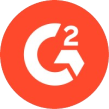 Shweta R.
Marketing Support Specialist
Mid-Market
(51-1000 emp.)
|
 07/06/2023
“For me MightyCall has most important feature like call waiting, call transfer and call forwarding which is very useful for our organisation. We can analysis our agents calls with help of live call monitoring and provide them feedback which helps us achieve higher productivity.”
|
2.Talkdesk
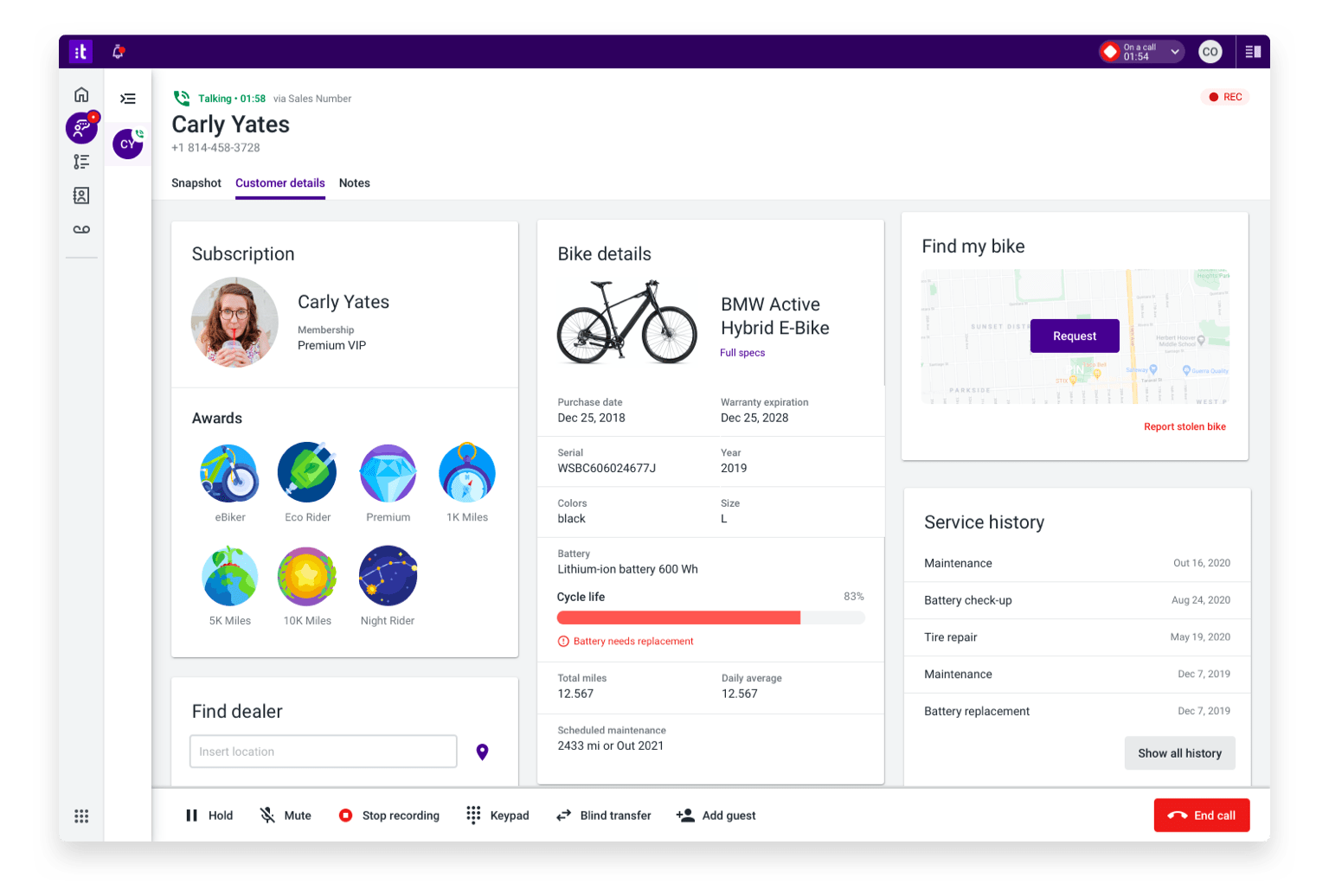
Talkdesk is a cloud-based call center solution that has gained recognition for enhancing customer service operations. Established as a leader in the industry, it is known for its commitment to innovation and customer success. Talkdesk offers cloud-based call monitoring software for various business needs such as hybrid workforce management and digital transformation.
Pricing:
- Essentials: $75 per month
- Elevate: $95 per month
- Elite: $125 per month
Free trial:
Offers a free 14-day trial.
Pros & cons:
| Pros | Cons |
|---|---|
| User-friendly interface | Difficulties with internal call transfers |
| Effective real-time dashboards | Challenges in filtering reports for different teams |
| Customizable call flows allow precise adjustments to match customer interaction strategies | The call quality monitoring software сosts more than other competitors |
| Integrations with CRM and other business tools | Reports of occasional glitches in call transfer features can disrupt the customer service flow |
Key features:
- Automated call flow
- Local presence dialing
- Call whispering
- Detailed KPI monitoring
Platforms supported:
Windows, Mac, Android, iOS
Best for:
Mid-sized companies looking for a scalable, customizable cloud-based call monitoring system.
User opinion:
Talkdesk is generally well-reviewed on G2 with an average rating of 4.3/5 for its user-friendly interface and feature set that greatly assists in managing customer interactions. However, some reviews point out challenges with technical support and a steep learning curve for new users. The platform is favored for its scalability and the ability to handle high call volumes.
3. Dialpad
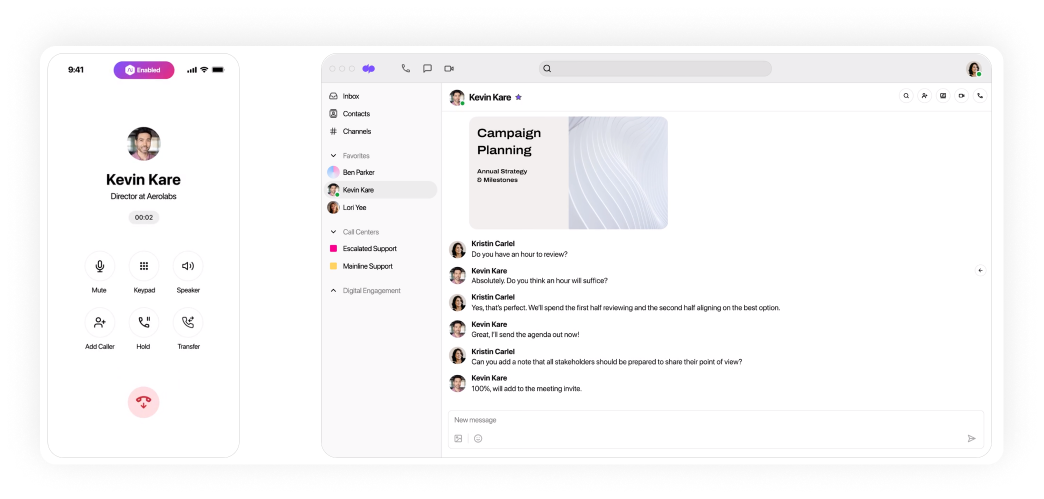
Dialpad is a versatile contact center solution with call monitoring that uses AI to enhance communication across its platforms, which include AI Call Center, AI Sales, AI Voice, and AI Meetings. Launched to address various business needs, Dialpad is known for rapid feature updates and expansions.
Pricing:
- Standard plan: $23 per month
- Pro plan: $33 per month
- Enterprise plan: pricing on request
Free trial:
Offers a free 14-day trial
Pros & cons:
| Pros | Cons |
|---|---|
| Real-time accurate transcriptions | May slow down user devices |
| Logs activities in one place | Limited admin control on standard plan |
| Integrates AI-driven insights to provide contextual data during live calls, improving agent responses and customer satisfaction | Some users report occasional lags and disruptions during calls, affecting communication quality |
| Call monitoring software’s pricing can be perceived as high compared to some competitors, especially for smaller businesses or startups |
Key features:
- HD conference calls
- AI-driven call insights
- Real-time assist cards
Platforms supported:
Windows, MacOS, iOS, Android
Best for:
Businesses of various sizes looking for AI-enhanced telecommunication solutions.
User opinion:
Dialpad receives praise on G2 with a 4.4/5 rating for its innovative use of AI technology to provide real-time call analytics and voice intelligence. Users appreciate the flexibility it offers across devices, though some mention a need for more training tools to fully understand and make use of all its features. The platform is commended for its easy setup and reliable customer support.
4. JustCall
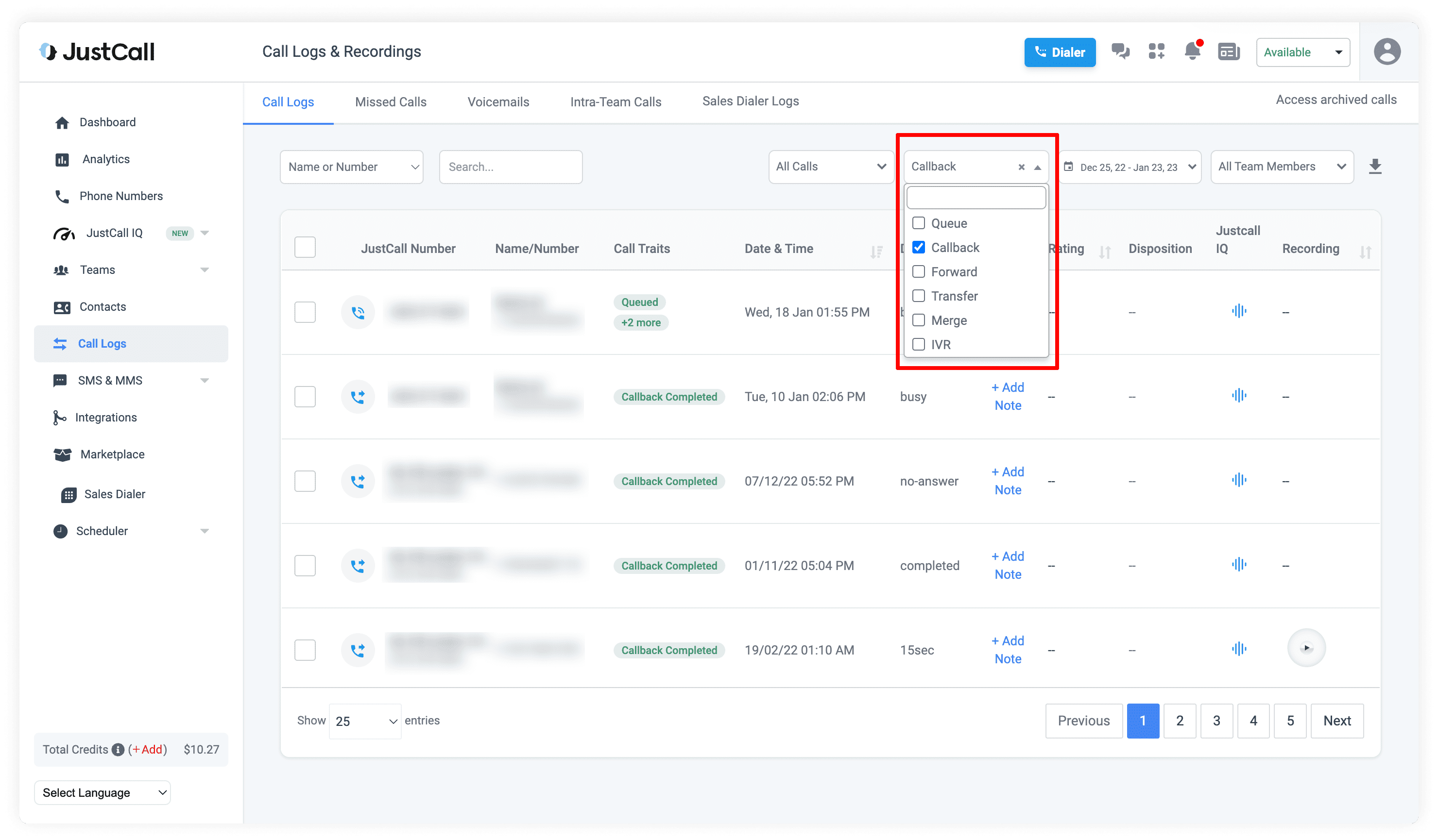
JustCall is a cloud-based phone system with inbound call monitoring tools launched in 2016, designed for businesses to manage calls globally with ease. Its interface is straightforward, catering especially to small and medium-sized enterprises and remote teams. JustCall highlights its integration with popular CRM systems, enhancing productivity and customer relationship management.
Pricing:
- Standard: $24 per user per month
- Premium: $48 per user per month
- Enterprise: Custom pricing
Free trial:
JustCall offers a 14-day free trial
Pros & cons:
| Pros | Cons |
|---|---|
| Affordable and easy to set up | Limited reporting features, doesn’t have call intercept |
| Advanced CRM integrations | No video conferencing capabilities |
| Some users report issues with call reliability, noting occasional dropouts or quality degradation | |
| Limited customization for call routing and handling procedures could be restrictive for complex call center operations |
Key features:
- Listening
- Whispering
- Barging
- Call recording
- Real-time monitoring
- Analytics and reporting
Platforms supported:
Web, Windows, Mac, iOS, Android
Best for:
SMBs that need a reliable and affordable phone system with strong CRM integrations.
User opinion:
Users generally appreciate JustCall for its affordability and ease of use with a rating of 4.1/5 on G2, Users appreciate its CRM integrations which help handle various sales and support processes. However, critiques often point to its less developed call monitoring tools and occasional technical glitches that need addressing.
5. CloudCall
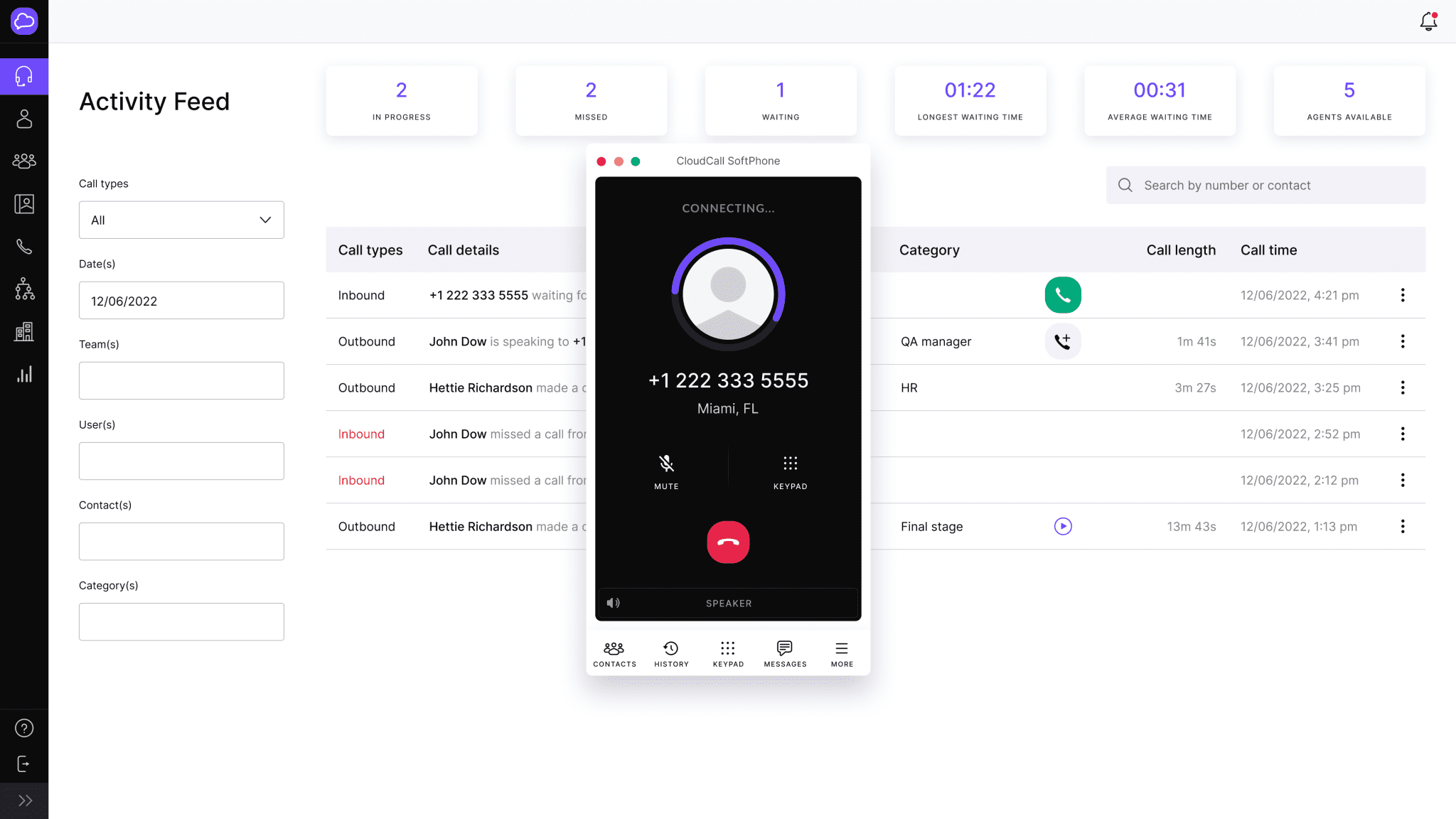
CloudCall is a communication platform with live call monitoring software that integrates with CRM systems to provide powerful call management system features. Established with a focus on enhancing customer relations, it supports industries such as recruitment, sales, and customer service by offering tested communication solutions.
Pricing:
- Pro plan starts from $15 per user per month
- Advanced starts from $25 per user per month
Free trial:
CloudCall offers a 7-day free trial to test its features
Pros & cons:
| Pros | Cons |
|---|---|
| Strong CRM integration | Doesn’t have a call intercept feature |
| User-friendly interface | Higher cost compared to some competitors |
| User-specific customization in call handling, enabling varying responses for different customer interactions | Performance can lag during periods of high call volume |
| Compliance tools help meet specific industry standards | Interface may present a learning curve for new users |
Key features:
- Live monitoring of the calls
- Call recording
- Call analytics
- Call barging
- Call whispering
- Real-time dashboards
Platforms supported:
Windows, MacOS
Best for:
Companies that require deep CRM integration with communication tools, particularly in sectors like recruitment and sales.
User opinion:
CloudCall is favored for its CRM integrations and ease of use with a 4/5 G2 rating, and is valued for its detailed analytics, which are beneficial for managing customer engagements and agent performance. However, users suggest that improvements could be made to enhance the user interface and call monitoring software responsiveness, especially during busy times. And some users note the pricing might be a bit high for smaller businesses.
6.CallHippo
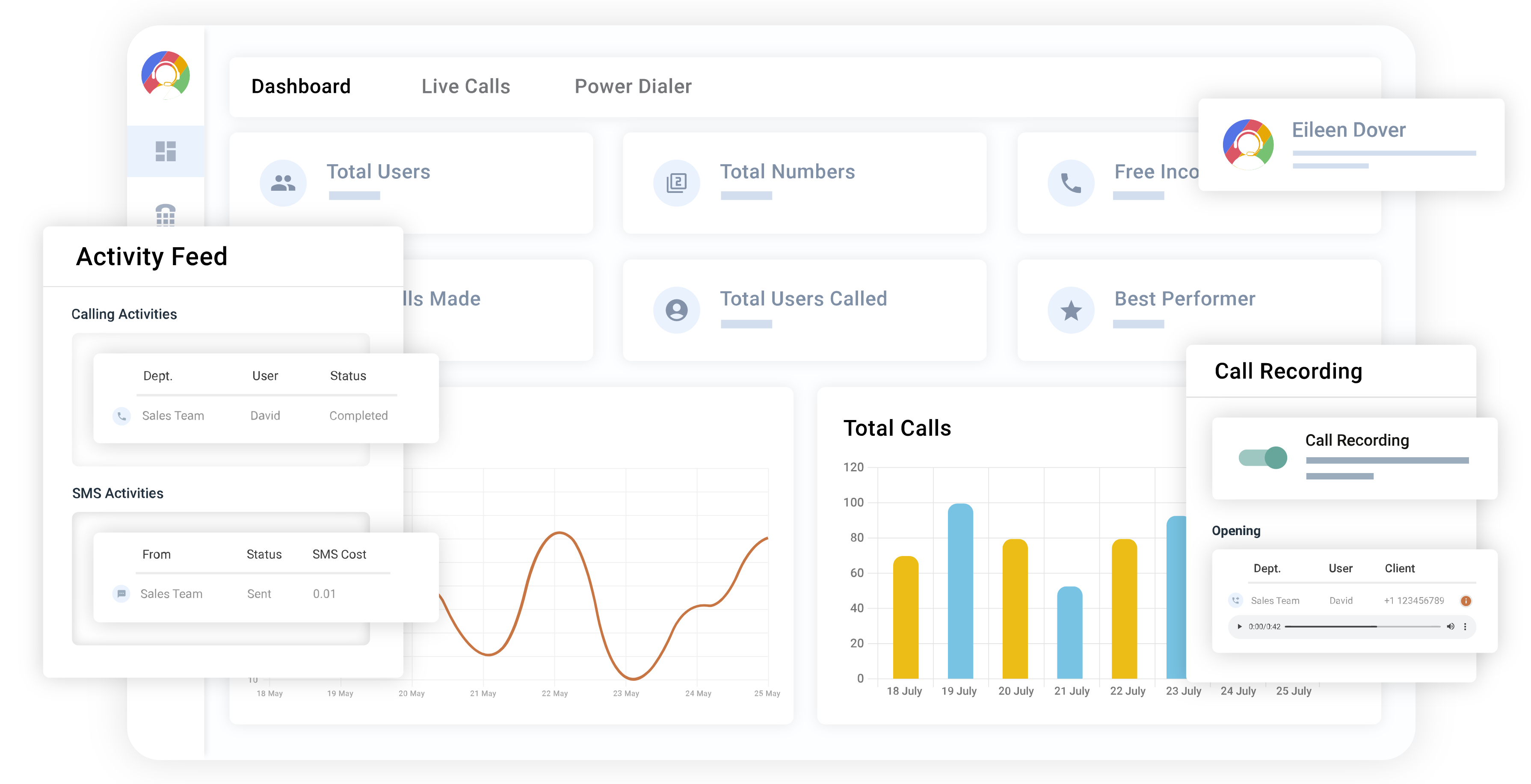
CallHippo, launched to enhance business communication globally, offers a monitoring software for call centers that caters primarily to startups and small businesses. The platform is designed to simplify setting up a communication system that supports a wide range of industries, including recruitment and marketing.
Pricing:
- Basic: Free
- Bronze: $20 per user per month
- Silver: $30 per user per month
- Platinum: $50 per user per month
Free trial:
CallHippo offers a 10-day free trial
Pros & cons:
| Pros | Cons |
|---|---|
| Free version available | Non-transparent pricing |
| Visual call summaries | Lacks the call intercept feature |
| Flexible pricing models cater to businesses of all sizes | Some users report issues with communication quality and reliability |
| Strong reporting tools provide actionable insights into call performance | Integration capabilities are basic, which might not suffice for complex enterprise needs |
| Good user interface | Customer support responsiveness can vary, according to some reviews |
Key features:
- Call recording
- Real-time call analytics
- Call queuing
- Call barging
- Call whispering
- Customizable call flows
Platforms supported:
Web browsers, Windows, Mac, iOS, Android
Best for:
Organizations of all sizes that need a cost-effective communication solution with essential call management tools.
User opinion:
CallHippo is generally well-regarded for its ease of use as an omnichannel call monitoring software with the free plan option with a 4.2/5 rating on G2, though feedback also points to some dissatisfaction with the depth of CRM integrations and occasional customer service delays. Users appreciate its scalability and simple pricing structure.
7. Zendesk
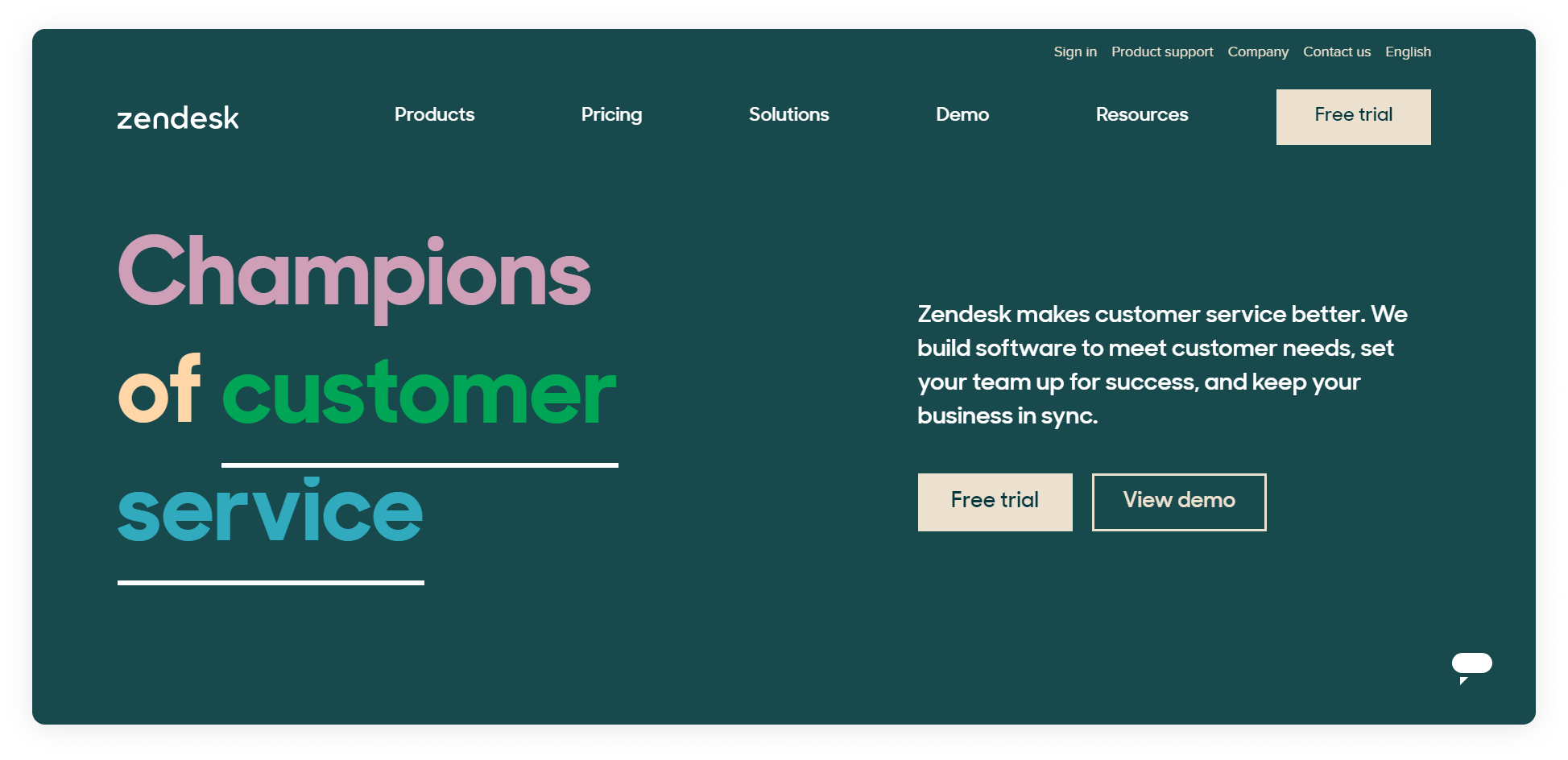
Zendesk provides a suite of customer service tools, including call center solutions, to help businesses manage customer interactions effectively. It is designed to improve customer service by integrating telephone support with ticketing, live chat, and self-service options. Zendesk supports multiple industries with flexible, scalable solutions.
Pricing (billed annually):
- Suite Team: $55 per agent per month
- Suite Growth: $89 per agent per month
- Suite Professional: $115 per agent per month
- Suite Enterprise: on demand
Free trial:
Zendesk offers a free trial that lasts for 30 days
Pros & cons:
| Pros | Cons |
|---|---|
| Integrates with multiple channels | Lacks call intercept functionality |
| Scalable and flexible | Can be complex to set up initially |
| Detailed analytics insights into call center performance and customer satisfaction | Some users find the pricing model to be higher compared to similar platforms |
| Occasionally reported as having minor bugs that affect user experience |
Key features:
- Call recording integration
- CRM Integration
- Real-time dashboards
- Call recording
- Team collaboration tools
- Automated workflows
Platforms supported:
Web, Windows, Mac, iOS, Android
Best for:
Businesses looking for an integrated customer support solution that combines voice with other communication channels.
User opinion:
Users appreciate Zendesk for its strong integration features and reliable customer support tools. Customers value the phone call monitoring software’s approach to managing customer interactions but have pointed out its higher cost and complexity. The service is generally praised for enhancing communication and organization with a 4.3/4 score on G2, but note the complexity in initial setup.
8. Nextiva
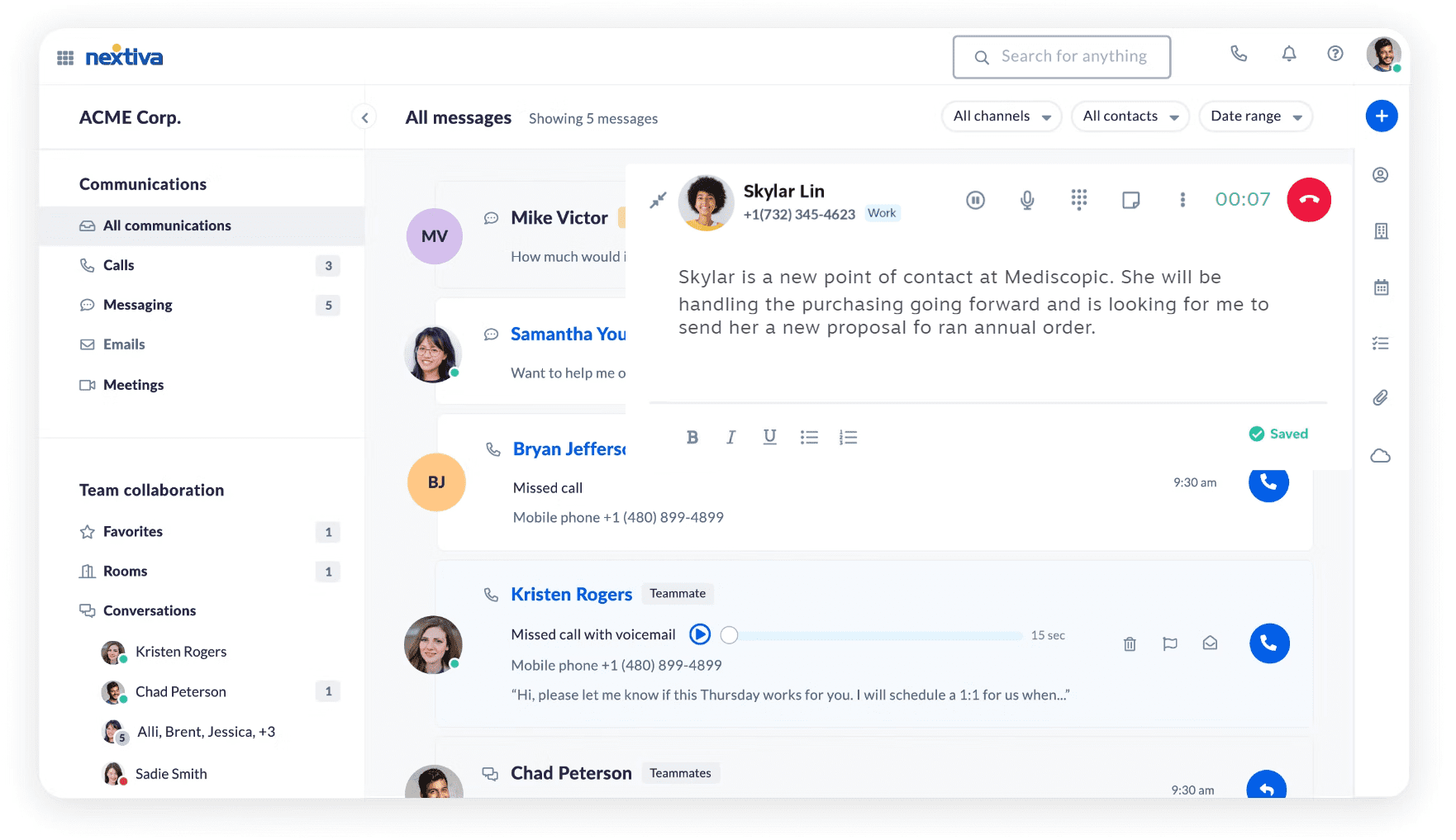
Nextiva offers cloud-based phone services with quality monitoring software for call centers designed to improve teamwork and customer communication. It supports a 99.99% uptime guarantee, ensuring consistent service availability. Nextiva is well-suited for a variety of industries, including healthcare and education, thanks to its scalable features and strong emphasis on reliability.
Pricing:
- Essential: $25.95 per month
- Professional: $30.95 per month
- Enterprise: $40.95 per month
Free trial:
Nextiva offers a 7-day free trial
Pros & cons:
| Pros | Cons |
|---|---|
| Reliable communication quality | No refunds for cancellations |
| A sleek mobile app | Some users have noted challenges with third-party integrations, especially with less common platforms |
| Extensive customization options allow businesses to adjust features to specific needs | The pricing structure can be confusing, with various features bundled into different tiers |
| Occasional customer support delays have been reported, impacting resolution times |
Key features:
- Tools for call monitoring
- Call recording
- Advanced call routing
- Call analytics
- Call pop-ups
- Call queuing
Platforms supported:
Windows, Mac, iOS, Android
Best for:
Startups and small businesses that prioritize high-quality voice services and require strong collaborative tools.
User opinion:
Users on G2 rate Nextiva highly, giving it an average of 4.5 out of 5, for its excellent communication quality and reliability. Users appreciate the flexibility and the range of features available, though some mention the need for clearer pricing and better support for integration issues. The platform is well-regarded for its functionality that supports large-scale operations. challenging.
9. Aircall
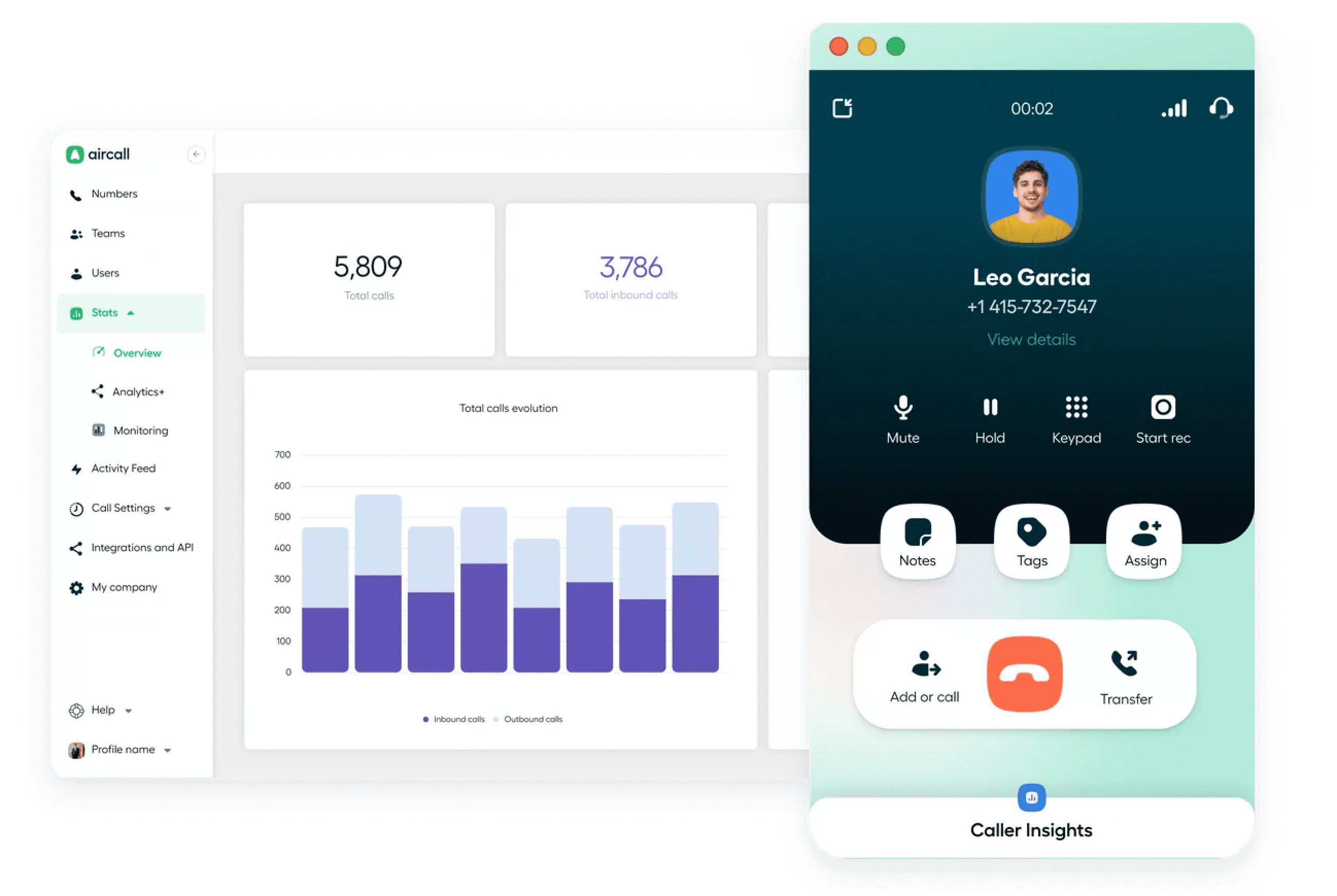
Aircall is a cloud-based contact center solution designed for ease of setup and use, supporting businesses of all sizes. It requires just a computer, headset, and internet connection to get started, making it ideal for quick deployment across customer service and sales teams.
Pricing:
- Essentials: $30 per user per month
- Professional: $50 per user per month
- Custom: Pricing available upon request
Free trial:
Aircall offers a 7-day free trial
Pros & cons:
| Pros | Cons |
|---|---|
| High-quality phone call service | Some features are missing, such as call intercept and call barging |
| Extensive reporting capabilities | Customer support can be slow |
| The interface is straightforward, encouraging quick mastery and use | More complex call routing setups may need additional customization |
| The cloud-based system supports business growth and adapts to changing needs | Pricing may be a barrier for smaller companies or startups |
Key features:
- Call monitoring
- Call whispering
- Shared contacts and call inbox
- Automated call distribution (ACD)
- Voicemail to email
- Instant call analytics
Platforms supported:
Windows 7 and higher, macOS 10.10 and higher, web, iOS, and Android
Best for:
Small to large enterprises seeking an easily deployable solution that integrates smoothly with other business tools.
User opinion:
Aircall has a G2 user rating of approximately 4.2 out of 5. The positive feedback is generally for its intuitive interface and effective CRM integration, making it popular among sales and support teams. Critiques often focus on the need for more reliable network performance and more responsive support services. The platform’s analytics and scalability are frequently highlighted as beneficial features.
10. RingCentral
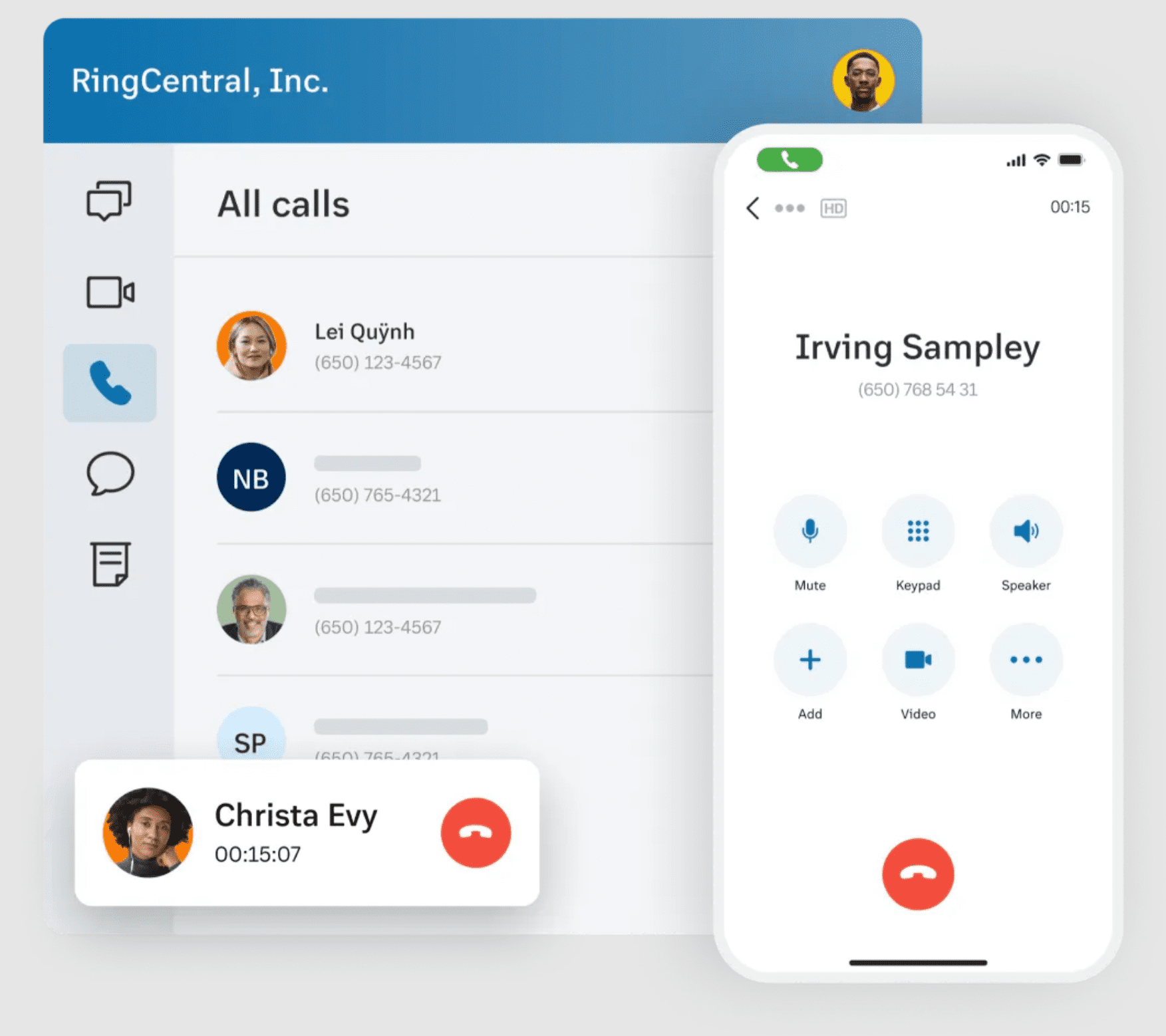
RingCentral is a cloud-based communications and collaboration platform for businesses of all sizes, from small enterprises to large corporations. It supports over 45 countries and offers a wide range of services that operate over the internet, removing the need for traditional phone lines.
Pricing:
- Essentials: $32.99 per month for up to 20 users
- Standard: $40.99 per month for unlimited users
- Premium: $47.99 per month
- Ultimate: $62.99 per month
Free trial:
RingCentral provides a 15-day free trial
Pros & cons:
| Pros | Cons |
|---|---|
| High uptime guarantee (99.999%) | May be expensive for smaller businesses |
| Extensive features across plans | Reports of occasional software crashes |
| Extensive monitoring options with detailed call analytics to improve strategic decisions | The system’s complexity may overwhelm new users |
| Reports of delayed responses from customer support |
Key features:
- Call delegation
- Presence and head-up display
- Caller ID and directory listing
- Analytics portal
- Real-time call monitoring
- Automated call routing
Platforms supported:
Windows, Mac, iOS, Android, Web
Best for:
Medium to large enterprises needing robust communication solutions with a strong emphasis on communication quality and reliability.
User opinion:
RingCentral is rated 4.1 out of 5 on G2. It is praised for its reliability and broad feature set.The platform’s ability to maintain effective communication across multiple devices is praised. However, some critics focus on the high cost of advanced plans and the need for a more user-friendly design.
11. NICE
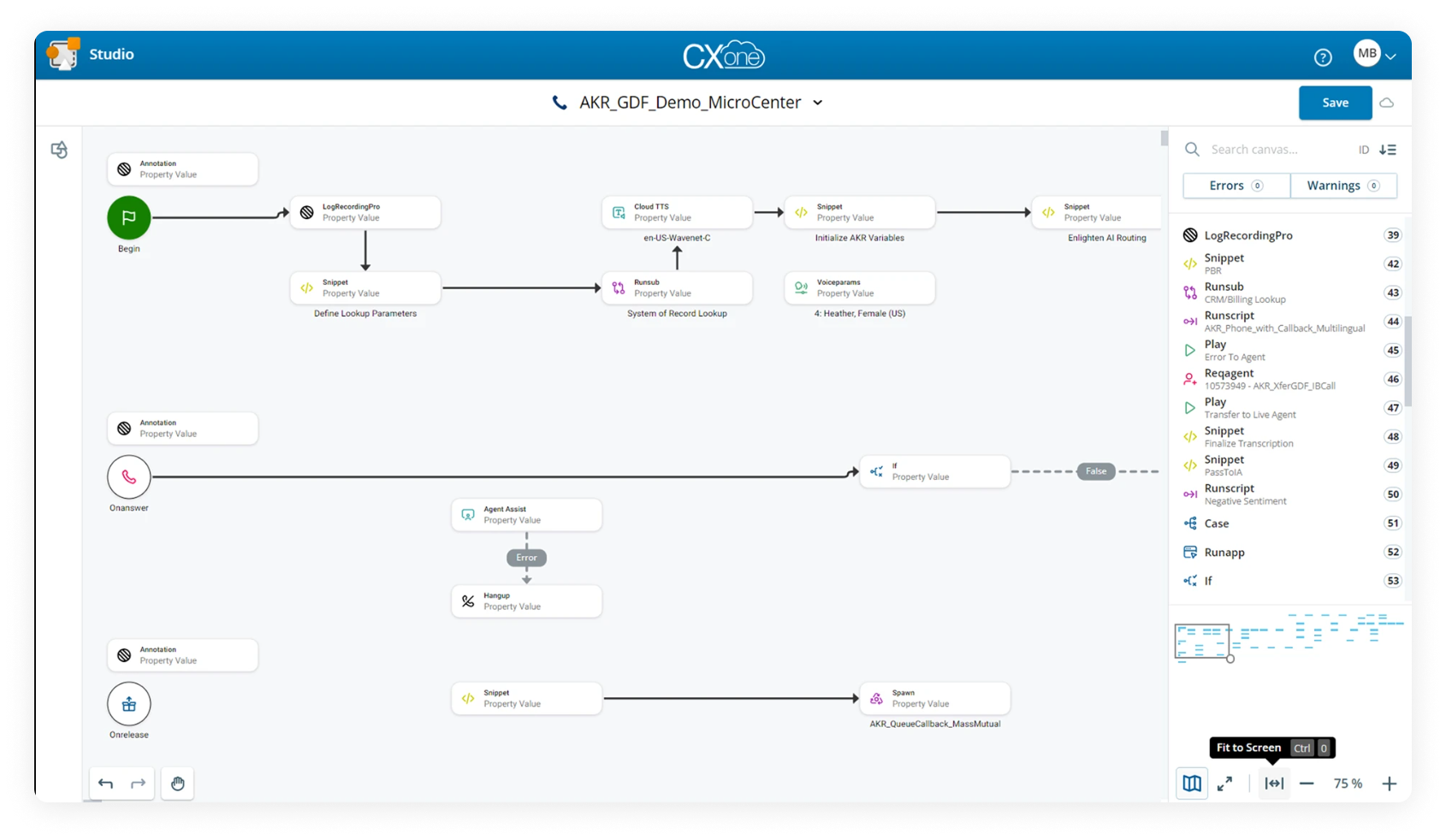
NICE provides advanced cloud-based customer experience platforms, extensively used in contact centers to enhance customer interactions through rich analytics and AI-driven insights. It supports a variety of industries, including finance, telecommunications, and healthcare, by optimizing both customer and employee engagement strategies.
Pricing:
- Essential Suite: $135 per user per month
- Core Suite: $169 per user per month
- Complete Suite: $209 per user per month
Free trial:
NICE provides a trial period, but the length varies based on business needs and the specific solutions implemented.
Pros & cons:
| Pros | Cons |
|---|---|
| Advanced analytical tools | Can be complex to implement |
| Strong AI integration | Pricing may be high for smaller organizations |
| Adheres strictly to international compliance standards, making it ideal for businesses in regulated sectors | Enhanced security and analytical tools result in higher overall costs |
| Integrated fraud detection tools proactively identify and mitigate potential security threats within communication data | Integration with older contact center systems often requires specialized technical support |
Key features:
- Real-time speech analytics
- AI-driven decisioning
- Workforce engagement management
- Fraud detection tools
- Customizable real-time feedback
- Proactive security measures
Platforms supported:
Windows, Mac, web-based platforms
Best for:
Large enterprises looking for AI-enhanced customer interaction and workforce management tools.
User opinion:
NICE is generally well-reviewed for advanced analytical capabilities and robust compliance features, marking it as a leader in these areas with a rating of 4.3/5 on G2. However, the complexity and integration challenges are noted as potential drawbacks, with the steep learning curve and higher cost also mentioned.
12. Five9
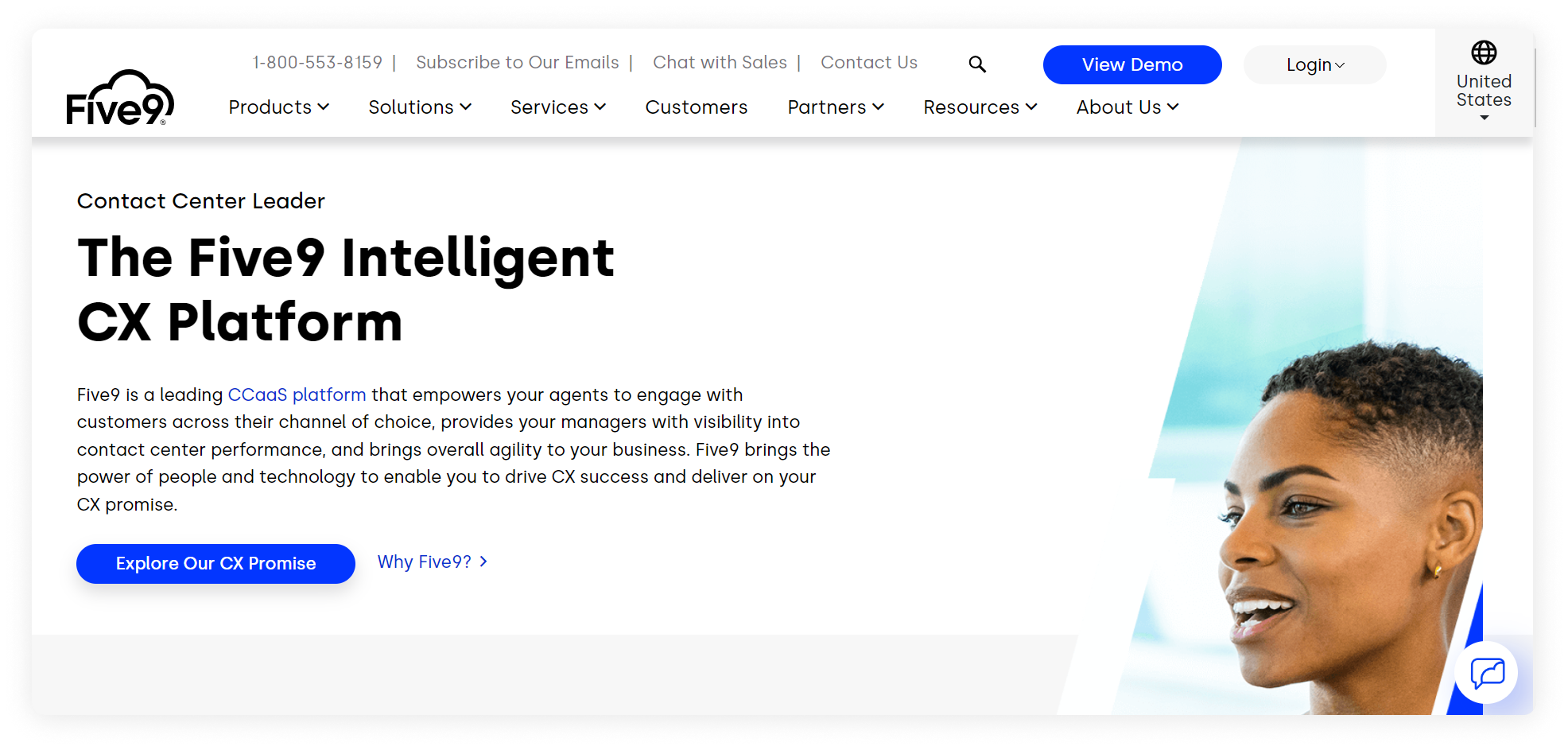
Five9 is a cloud contact center solution designed to enhance customer service across various channels. It’s call quality monitoring system integrates with several CRMs to organize operations and improve customer interactions, offering solutions to different industry needs without support for call intercept.
Pricing:
- Core & Digital: $175 per user per month
- Premium: $235 per user per month
- Optimum: $290 per user per month
- Ultimate: $325 per user per month
Free trial:
Five9 offers a free trial, with details available upon contacting their sales team.
Pros & cons:
| Pros | Cons |
|---|---|
| An impressive feature set | The call monitoring software features do not include call intercept functionality |
| High scalability for all business sizes | Initial setup can be complex |
| Prioritizes disaster recovery features, ensuring high service availability | Custom work may be required for integration with less common CRM systems |
| Employs artificial intelligence to refine interactive voice responses and agent support tools | Potential latency issues during peak usage times can affect call handling performance |
Key features:
- Multichannel routing
- CRM integration
- Real-time reporting and analytics
- Automated call distribution
- Quality management tools
- Workforce optimization
Platforms supported:
Windows, MacOS, web-based platforms
Best for:
Businesses of all sizes that need a scalable, multi-channel contact center solution.
User opinion:
Users rate Five9 positively with a score of 4.2/5 on G2 for its wide range of features and scalability but note complexities in setup and integration. Users appreciate the call monitor software for its effective automation of inbound and outbound calls, which helps with workflow and increases productivity. Concerns are often raised about the platform’s initial complexity, making it difficult for new users to adapt without significant training.
How we ranked these call monitoring services
We evaluated the call monitoring services using a detailed approach to ensure that our recommendations are reliable and comprehensive. Here’s a breakdown of our criteria:
- Features: We assessed the variety and effectiveness of features offered by each service, such as call recording, live monitoring, and analytics capabilities, which are crucial for improving customer service and compliance.
- Price & availability: Affordability and the availability of multiple pricing tiers to cater to different business sizes were considered, ensuring that the services are accessible to a wide range of companies.
- Total cost (including add-ons): We looked at the overall cost when including necessary add-ons to avoid hidden expenses that could affect the budget of a company.
- Call quality: The clarity and reliability of calls were tested, as high communication quality is essential for effective communication.
- User support/quality of service: The level of customer support provided, including response times and the quality of service, were key factors in our assessment.
- Operational stability (reliability): The overall reliability of the service, including uptime and the robustness of the infrastructure, was critically evaluated.
Key features of call center monitoring software
Effective call center monitoring software solutions incorporate several key features to optimize both agent performance and customer satisfaction. Below are essential features:
Call monitoring
This rather obvious yet important feature set includes tools such as call listening, call barging, call whispering, call intercept, and call recording, and subsequent playback. It enables supervisors to evaluate agent performance and ensure compliance with service standards.
Real-time analytics
Access to real-time data is crucial. This feature provides instant insights into call metrics, helping managers make informed decisions to improve success rates and caller satisfaction.
Integrated CRM
Integrating with customer relationship management systems allows agents to access caller information, enhancing personalized communication and boosting customer engagement. If the call center monitoring software doesn’t offer that, it might prevent your company’s growth.
Quality management tools
These include scorecards and feedback tools. They are essential for assessing agent performance and offering targeted coaching and training based on individual performance metrics.
Automated workflows
Automating routine tasks helps in standardizing operations and stabilizing the workflow. This includes routing calls based on agent skill set and availability, reducing wait times and improving the customer experience.
Multi-channel support
Supporting various communication channels such as voice, text, email, and social media from a single platform ensures that customers can reach out through their preferred method, enhancing service accessibility and satisfaction.
Adaptive performance management
This feature focuses on improving long-term agent development and operational success. By using advanced algorithms to track performance trends and provide predictive insights, managers can preemptively adjust strategies to better meet KPIs. This proactive approach ensures that performance management evolves with the needs of the call center, fostering a dynamic and responsive working environment.
These features collectively enhance call center operations, ensuring a high service quality and maintaining a competitive edge. MightyCall’s call monitoring software is set on making the best of many of these essential tools, focusing on call monitoring, CRM integration, and workflows, making it a practical choice for enhancing call center operations. Given its strive for adding new competitive features, users can rest assured they will get the best tools available to the industry.
Benefits of call monitoring software
Enhanced training and performance feedback
A call center monitoring tool provides an invaluable resource for training new agents by allowing supervisors to listen in on calls and offer immediate feedback. This targeted coaching can lead directly to improved customer interactions, as agents learn in real-time what practices lead to successful outcomes.
Precise quality assurance
The call center quality monitoring software enables continuous quality assurance through detailed analytics and recording capabilities. Managers can review calls to ensure that all customer interactions meet the company’s standards of service, leading to a consistent customer experience.
Improved dispute resolution
With call recording features, any customer disputes or complaints can be resolved by replaying interactions to clarify misunderstandings. This not only speeds up resolution times but also helps in maintaining customer trust and satisfaction.
Organized operations
Automated features like call tagging and categorization help organize call center dialing workflows by organizing calls based on predefined criteria. This reduces manual sorting and allows for more efficient handling of customer inquiries.
Data-driven decision making
Call monitoring systems collect vast amounts of data which can be analyzed to uncover patterns and insights. These analytics help managers make informed decisions about staffing, training needs, and customer service strategies, all aimed at optimizing the call center’s operations.
Enhanced regulatory compliance
For industries bound by strict communication standards, such as finance and healthcare, call monitor software ensures compliance with legal requirements by recording and archiving calls as needed. This protects both the business and the customer in case of audits.
Who uses call quality monitoring software in call centers?
- Call center managers use call center monitoring software to oversee agent performance, ensuring adherence to quality standards and improving customer interaction.
- Customer service representatives work with feedback from monitoring for self-improvement and training purposes, enhancing their communication skills.
- Quality assurance teams employ the software to identify trends, gather data, and ensure compliance with regulatory standards.
- Training professionals analyze virtual calling data to develop targeted training programs that address specific weaknesses in agent performance.
How to choose the best call monitoring solution?
Selecting the right call monitoring program requires careful consideration of several key factors to ensure it meets the specific needs of your organization:
- Scalability: Consider whether the service can scale with your business growth. A good solution should be able to handle increasing call volumes and additional users without performance degradation.
- Feature set: Assess the specific features offered by the solution, including call recording, analytics, and reporting tools. Ensure that these features align with your call center’s operational needs and goals.
- Compliance and security: Verify that the solution complies with industry standards and regulations, such as DNC Registry for cold calling or HIPAA for healthcare in the United States. The call center quality monitoring software should also provide robust security measures to protect sensitive data.
- User reviews and reputation: Research user reviews and the reputation of the provider. Reviews from current and past users can provide insights into the reliability of the software and the quality of customer support.
- Cost-effectiveness: Analyze the total cost of ownership, including initial setup fees, monthly or annual subscription fees, and any additional costs for upgrades or extra features. Ensure the pricing is transparent and fits within your budget.
Considering these factors will help you choose a call monitoring solution that not only fits your current needs but also supports future growth and changes in technology.
Call monitoring software best practices
Configure alerts for keyword and sentiment detection
Set up your call center monitoring software to alert supervisors when specific keywords or sentiments are detected during calls. This feature can flag issues in real-time, allowing for immediate intervention or follow-up, thus enhancing both training and customer satisfaction.
Optimize recording settings based on needs
Adjust the recording settings to match your operational requirements—whether it’s recording all calls for compliance or selective recording for quality checks. Proper configuration ensures you capture relevant data without overwhelming your storage with unnecessary recordings.
Employ advanced analytics for deeper insights
Use the call monitoring system’s analytics capabilities to gain deeper insights into call patterns, agent performance trends, and customer satisfaction metrics. Analyzing this data can help refine your customer service strategies and improve overall efficiency.
Regularly update access permissions
Manage who has access to recorded calls and analytics to ensure compliance with privacy laws and internal policies. Regular updates to access permissions help protect sensitive information and maintain trust both within the team and with customers.
Integrate machine learning for continuous improvement
Implement machine learning algorithms to analyze call data continuously. This call monitoring software solution feature can help in identifying emerging patterns and providing automated quality assurance, reducing the reliance on manual reviews and increasing operational success.
Enhance data granularity
Refine data capture by setting detailed parameters that categorize call types, outcomes, and customer feedback more granitically. This enables more precise analysis and better targeted improvements in customer service strategies.
Automate compliance checks
Get a call monitoring system software that automatically checks for compliance with both internal standards and external regulations during calls. This proactive measure ensures continuous compliance and reduces the risk of violations.
Make operations easy with call quality monitoring software
Call center phone monitoring software is pivotal for enhancing customer service and compliance. By implementing this technology, businesses gain access to features such as real-time analytics and integrated CRM systems to streamline operations and improve agent performance. The software supports robust training programs, ensures compliance with regulations, and optimizes both customer satisfaction and operational workflows. Embrace these tools to not only meet but exceed customer expectations and drive your business forward.







